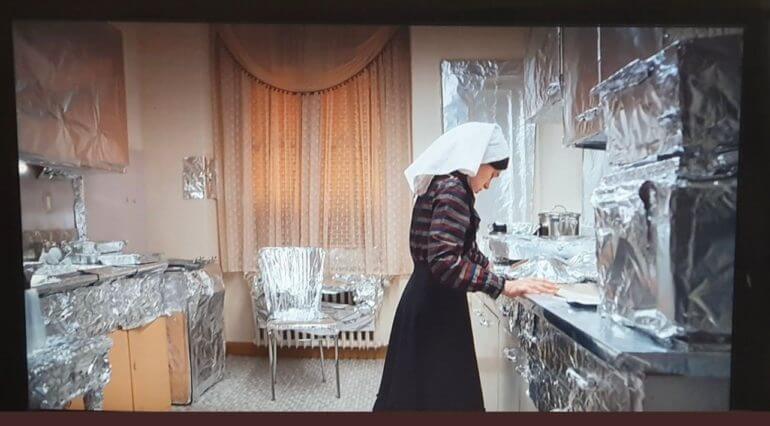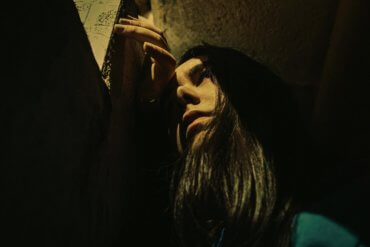
Why Do Orthodox Jews Cover Their Kitchens In Foil?
Dear Jew in the City,
I saw in Unorthodox a kitchen covered in tin foil. Why do Orthodox Jews do this?
Thanks,
Brad
Dear Brad,
Thanks for your question. Whenever I receive a question that starts “Why do Orthodox Jews…,” my initial reaction is, “They don’t” because such questions usually represent gross generalizations. This was probably never more true than in the case of “Why do Orthodox Jewish women shave their heads?” Of course, the overwhelming majority don’t, it’s just that the few who do stand out.
In the case of covering kitchens, you may be on to something, but it has to be qualified. 51 weeks of the year, you won’t find Jews covering their kitchens. The remaining week you will, though not necessarily with foil.
That week, which occurs in the Jewish month of Nisan (roughly corresponding to April), is the holiday of Pesach (Passover), which is seven-days long in Israel and eight days long everywhere else. On Pesach, we’re not allowed to eat leaven or anything leavened, which is why we eat matzah, a cracker-like unleavened bread. (And yes, I know, Sephardic Jews eat soft matzah. Most of us here, however, are familiar with the crunchy stuff that leaves a lot of crumbs.) The prohibition against chometz (leaven) is extremely stringent, so we guard against even the smallest volume. Accordingly, our kitchens must be kashered (“kosherized”). Things that can’t be koshered must be put away or (wait for it…) covered.
If you visit different houses, you may notice different things covered or uncovered. This is because, not only are there different opinions as to what can and cannot be kashered, but people also own different things.
The most obvious thing is probably countertops. Some types of counter, like granite and stainless steel, can be kashered. These, therefore, need not be covered. Other counters might be made of a non-kasherable material and would therefore have to be covered. This might be with foil but it could also be with something else. Some people use contact paper. I have corrugated plastic cut to fit my countertops. Some people have custom countertops that they swap out for Pesach. In the latter case, you wouldn’t even notice that the counters were made “kosher for Passover.”
There are other things in the kitchen that one might cover for Pesach. For example, stainless steel sinks can be kashered but porcelain sinks can’t be. Again, some may use foil, others may use contact paper. My family has a fitted sink insert, which is like a sink within a sink.
Other things that you might see covered include range tops, the grates (upon which the pots rest when on the stove) and the inside of an oven – but you won’t necessarily see them covered everywhere because, again, there are some differences of opinion as to what can be effectively kashered, and the material of which something is made often makes a difference. (And, just like I have a sink insert, some people have an oven insert.)
One thing that doesn’t have to be covered is the walls, though even this has an exception. There area behind the stove where cooking food tends to splash is called the splashback. Splashbacks must be cleaned, and preferably covered so that hot Pesach cooking pots don’t touch these surfaces.
There are so many variables at play that everyone’s kitchen can look very different. I knew a guy who had a kitchen with a sink and a stove, plus a center island. Come Pesach, special countertops covered his sink and stove, while the countertop came off the center island, revealing his Pesach sink and stove. His kitchen looked perfectly normal, just different from its year-round configuration. On the other hand, some people choose to go nuts with the foil. Either they’re unaware that certain things don’t need to be covered or they just don’t care. Chometz on Pesach is such a serious matter that many people choose to go beyond the letter of the law; this is considered praiseworthy. One way or the other, you can’t judge a book by its cover and you can’t judge a kitchen by its foil.
Sincerely,
Rabbi Jack Abramowitz, JITC Educational Correspondent
Follow Ask Rabbi Jack on YouTube
PS – Don’t believe everything you see on TV!
If you found this content meaningful and want to help further our mission through our Keter, Makom, and Tikun branches, please consider becoming a Change Maker today.








7 comments
Sort by
I just had an exchange with an Orthodox neighbor on this very subject. While I love the symbolism of these gestures and appreciate the importance of tradition, the biology of yeast is another matter entirely.
As a baker, I read an interesting article about how the wild yeast in starter is actually combined with yeast that lives on your hand. So the baker and their starter are linked biologically. When you share starter, that then takes on the biology of the new yeast living on the friends hand. While the tradition of excluding the leaven is beautiful, the reality of biology is that you would need to have Seder Dinner in a space ship to avoid all leaven.
Another point concerning this tradition relates to conservation. If we can agree that leaven is all around us, is the act of covering surfaces a waste of resources and contributing to a climate catastrophe?
Should traditions adapt to include a view towards environmental conservation?
Wishing a blessed Passover to you.
Thanks for your question. The se’or (leaven) that the Torah prohibits is what we would call sourdough, which, as you allude, attracts yeast from the air, but it is not itself yeast. We don’t use baker’s yeast or brewer’s yeast on Passover but they’re not part of the Biblical prohibition and one may own then over the holiday. Microorganisms that occur naturally are not part of the prohibition and are not restricted in any way. (Amoebae and paramecia that can’t be seen are not subject to laws of non-kosher animals. Jewish law does not restrict the microscopic.)
As far as environmental concerns, did you know that the web generates 2% of the planet’s CO2 emissions? Yet here we are, presumably because we consider it necessary to be online despite the environmental impact. Similarly, those who cover their kitchens in foil do so because they consider it necessary. Perhaps they could be encouraged to go another route, like reusable, pre-cut corrugated cardboard but it probably hasn’t occurred to some, it may be too big an expense for others, and still others are no doubt simply set in their ways.
Do you think the reason micro-organisms may not be prohibited because we weren’t advanced enough to know about them at the time the book was wrote? It seems somewhat coincidental to me that things we weren’t aware of went unprohibited. Rather convenient in my opinion.
No. It’s because they’re not relevant to the Passover story.
True, but also as a general halachic principle, things that can’t be seen with the naked eye are not proscribed. The Torah was given through Moshe, not through Anton van Leeuwenhoek. It had to be meaningful to – and practicable by – the generation that received it. We’re not concerned about microscopic organisms, nor about things that happen at a quantum level, or in the eighth-and-a-half dimension, should we ever discover it. One Torah was given at Sinai and it didn’t have sealed chapters saying, “Do not open until 1666,” etc.
I worked for Jewish people and loved learning about there religious believes for 6yrs in NY INDEPENDENT senior living wonderful beautiful people sha ba sha Lon love and miss
I just love how the families and the community sick together in worship. I wish I had something like that in my life.